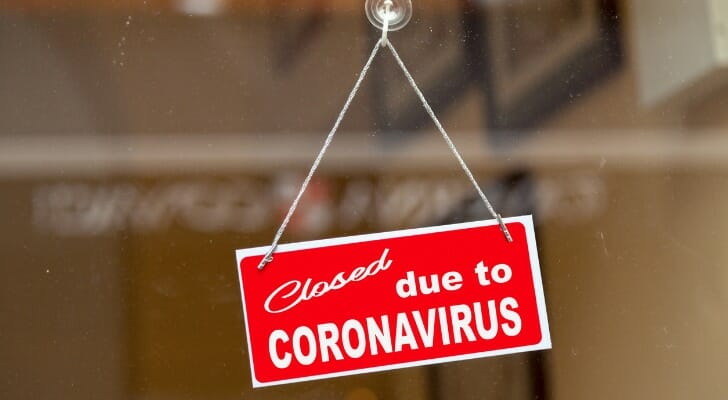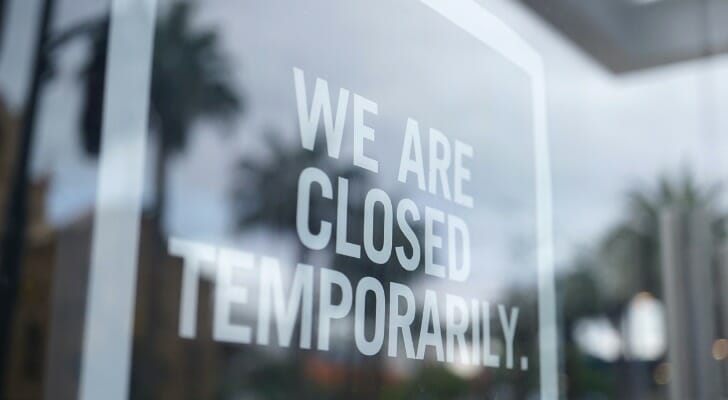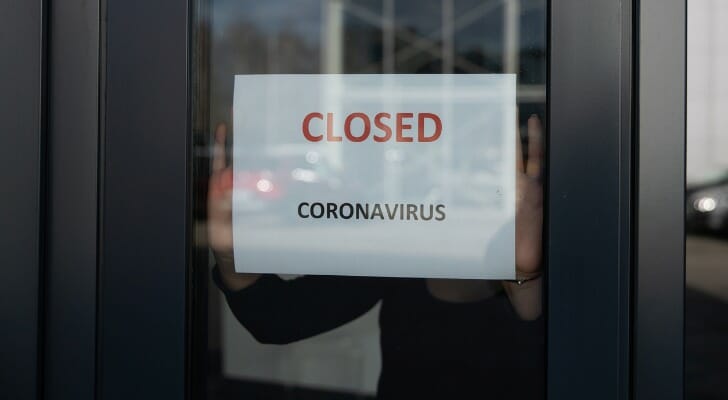Coronavirus Relief for Businesses
The COVID-19 pandemic has impacted every aspect of American life, including small businesses. With most Americans practicing extreme social distancing and not going out of the house except when absolutely necessary, many...Wednesday, March 25th 2020, 11:07 am
By Ben Geier, CEPF®

The COVID-19 pandemic has impacted every aspect of American life, including small businesses. With most Americans practicing extreme social distancing and not going out of the house except when absolutely necessary, many small businesses have a dearth of customers as they navigate the recession. In some major markets, including New York, California and Chicago, governments have issued rules mandating that all non-essential businesses close and that restaurants only offer take-out and delivery. Understandably, this has put an enormous strain on small businesses, many of which are barely eking out a profit anyway. As small business owners meet with their financial advisors to strategize amid the economic downturn, it is important that they understand what stimulus packages they’re entitled to from the federal Coronavirus Aid, Relief, and Economic Security Act (CARES) Act and on the state level.
Some states have put together relief packages to help these small businesses make it through this increasingly difficult time. SmartAsset has rounded up all of these programs along with information on how you can apply for them if you are a small business owner struggling as a result of the coronavirus crisis.
FederalThough it has not officially been approved yet, Congress and the White House have agreed in principle to a $2 trillion stimulus package that would include $350 billion in small business loans. The exact way these loans will be allocated has not yet been announced. The package also includes $500 billion in loans for distressed companies.
President Donald Trump has stated that he is “deeply committed to ensuring that small businesses have the support they require.” He has signed legislation to support low-interest disaster loans for any business impacted by coronavirus. These loans are administered by the small business administration and are available for up to $2 million in states where an economic disaster has been declared. The interest rate is 3.75% for businesses and 2.75% for nonprofits. The term of the loan varies by applicant but could be up to 30 years. Interested small business owners can apply here. Make sure you also understand your business interruption insurance coverage.
Additionally, don’t forget that the 2020 deadline for filing taxes has been pushed back to July 15 for both individuals and businesses. More federal relief efforts are likely to be coming in the days and weeks ahead.
ArizonaArizona has passed a $50 million bill for coronavirus relief, but leaves much of the details in the hands of Gov. Doug Ducey. For this reason, more details aren’t available at this time in terms of how exactly it will help small businesses or what businesses will need to do to get funds. The bill does specify that businesses and nonprofits with fewer than 50 employees will receive relief.
ArkansasGov. Asa Hutchinson has announced that the state will use $12 million from Community Development Block Grants and $4 million from the state’s Quick Action Closing Fund to help small businesses struggling during the outbreak.
CaliforniaA number of programs are available in California, one of the states most impacted by the COVID-19 pandemic.
San Francisco has a Small Business Resiliency Fund for businesses that have between one and 25 employees, have less than $2.5 million in gross receipts and can demonstrate a loss of revenue of 25% or more. To apply for this program click here.
Los Angeles is offering microloans to small businesses of between $5,000 and $20,000. The term goes between six months and five years. The rate is 0% for a term of between six months and one year and between 3% and 5% for loans with a term of between one year and five years. Up to $11 million in these loans will be available.
ColoradoDenver, the largest city in Colorado, is offering businesses up to $7,500 if they are in an industry that is particularly impacted by the crisis. There still aren’t many details on how this program will work, but interested businesses can fill out a form here.
DelawareGov. John Carney announced that restaurants, bars, hotels and other hospitality businesses will be eligible for the Hospitality Emergency Loan Program (HELP), offering no-interest loans at up to $10,000 per business per month. The loans have a 10-year term and have payments deferred for nine months. To be eligible, a business must have been operating for at least a year, have annual revenue below $1.5 million and be in a hospitality-connected industry. You can email business@delaware.gov to see if you qualify or call 302-739-4271 with more questions.
Florida
Gov. Ron DeSantis activated the Florida Small Business Emergency Bridge Loan Program, giving short-term interest free loans to small businesses impacted by COVID-19. Up to $50 million has been allocated for the program, Each loan is for one year and can for up to $50,000. Apply for the program online here.
GeorgiaGeorgia has delayed registration and registration fees for all corporations.
IllinoisChicago, Illinois’ largest city, is working with the Catalyst Fund and private sponsors to offer the Chicago Small Business Resiliency Loan Fund. It will provide more than $100 million in low-interest loans to businesses severely impacted by the crisis, focusing on historically under-resourced communities. Up to $50,000 will be available to a single business. The program launches March 31, but interested businesses can fill out an interest form here.
IowaIowa has launched the Iowa Small Business Relief Program, giving assistance to businesses impacted by COVID-19. The program offers grants of between $5,000 and $25,000 which can be used to help maintain operations or reopen following the pandemic. Funds cannot be used to pay debts incurred before March 17, 2020. The application deadline is March 31, and the application is available here.
KansasKansas allocated $5 million for the Hospitality Industry Relief Emergency (HIRE) fund to provide bridge loans to businesses in the hospitality industry. The loans are for up to $20,000 at a 0% rate over a period of 36 months. Kansas has allocated all of the initial funds but is still asking businesses to fill out the form here to continue to collect information about businesses that need help.
MarylandThere are two programs available in Maryland:
- The Maryland Small Business COVID-19 Emergency Relief Loan Fund is a $75 million fund offering loans at no interest or principal payments due for the first 12 months, then converts the loan to a 36-month loan with a 2% interest rate per annum. Apply here.
- The Maryland Small Business COVID-19 Emergency Relief Grant Fund is a $50 million program offering grants of up to $10,000, not to exceed three months of demonstrated cash offering expenses for the first quarter of 2020. Apply here.
The Michigan Small Business Relief Program will be offering grants of up to $10,000 and loans of between $50,000 and $200,000 with interest rates of 0.25%. A total of $10 million loans and $10 million in grants will be available. Loans are for companies with 100 employees or less while grants are only for companies with 50 employees or less. Funding will be available around April 1. Application details aren’t available yet but will be posted here.
MinnesotaMinnesota has created the Small Business Emergency Loan Program, making available $30 million for loans to small businesses. The loans will be for between $2,500 and $35,000. Each will be 50% forgivable and offered at a 0% interest rate. The application is not yet live but those with questions can email elp@state.mn.us
New MexicoThere is no specific COVID-19 small business assistance in New Mexico, but the state is adjusting its business-loan guarantee programs to make capital more readily available for business owners who are impacted by the crisis.
New YorkThe following programs are available in New York:
- New York City Employee Retention Grant Program. This is for businesses within the five boroughs of New York City with between one and four employees who can demonstrate that COVID-19 has caused at least a 25% drop in revenue. Businesses must have been in operation for at least 6 months. Businesses can get a grant covering up to 40% of their payroll, capped at $27,000. Apply here.
- New York City Small Business Continuity Loan Fund. This program is for businesses located in New York City with fewer than 100 employees who have lost at least 25% of revenue because of the pandemic. The program offers zero interest loans for up to $75,000. Fill out the pre-application here.

The following programs are available in Oregon:
- The town of Beaverton — a suburb of Portland — has formed an Emergency Business Assistance Program. The program is for businesses with a Beaverton business license who have seen their business impacted by mandatory state guidelines. For now, that means restaurants. The program reimburses up for $2,500 a month for those businesses with 50 employees or less who can verify they are seeing an economic loss due to COVID-19. Apply here.
- Hillsboro, Oregon put committed up to $500,000 for businesses impacted by COVID-19 but the program has stopped accepting applications due to demand.
- The Jade District in Portland has up to $190,000 available for businesses impacted by the outbreak. Apply here.
- If you’re worried about your portfolio during the COVID-19 crisis, a financial advisor can help. A financial advisor can help. Finding the right financial advisor who fits your needs doesn’t have to be hard. SmartAsset’s free tool matches you with financial advisors in your area in five minutes. If you’re ready to be matched with local advisors that will help you achieve your financial goals, get started now.
- If your salary changes because of the crisis, your tax bill may change as well. Use SmartAsset’s free tax calculator to see.
Photo credit: ©iStock.com/Gwengoat, ©iStock.com/Kameleon007, ©iStock.com/djedzura
The post Coronavirus Relief for Businesses appeared first on SmartAsset Blog.
Information contained on this page is provided by an independent third-party content provider. Frankly and this Site make no warranties or representations in connection therewith. If you are affiliated with this page and would like it removed please contact pressreleases@franklymedia.com
More Like This
March 25th, 2020
December 13th, 2024
December 13th, 2024
December 13th, 2024
Top Headlines
December 13th, 2024
December 13th, 2024
December 13th, 2024
December 13th, 2024







